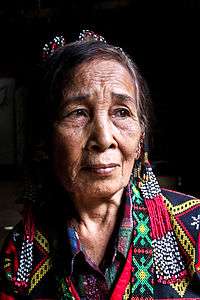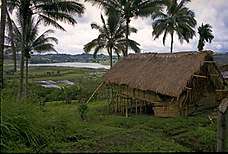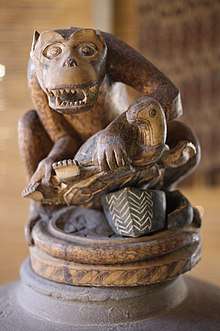Tboli people
 A Tboli elderly woman in traditional attire. | |
| Total population | |
|---|---|
| Approximately 100,000–150,000[1] | |
| Regions with significant populations | |
|
| |
| Languages | |
| Tboli, Cebuano, Hiligaynon, Tagalog | |
| Religion | |
| Christianity, Animist, and Pagan | |
| Related ethnic groups | |
| Austronesian peoples, Lumad, and Sama-Bajau peoples |


The Tboli people are one of the indigenous peoples of South Cotabato in Southern Mindanao. The body of ethnographic and linguistic literature on Mindanao, they are variously known as Tboli, T'boli, Tböli, Tagabili, Tagabilil, Tagabulul and Tau Bilil. They term themselves Tboli. Their whereabouts and identity are somewhat imprecise in the literature; some publications present the Tboli and the Tagabili as distinct peoples; some locate the Tbolis to the vicinity of the Lake Buluan in the Cotabato Basin or in Agusan del Norte. The Tbolis, then, reside on the mountain slopes on either side of the upper Alah Valley and the coastal area of Maitum, Maasim and Kiamba. In former times, the Tbolis also inhabited the upper Alah Valley floor. After World War II, i.e., since the arrival of settlers originating from other parts of the Philippines, they have been gradually pushed onto the mountain slopes. As of now, they are almost expelled from the fertile valley floor.
Like their immediate tribal neighbors, the Úbûs, Blàan, Blit, Tàú-Segél and, for those who have serious doubts in the hoax argumentation, the Tasaday, they have been variously termed hill tribes, pagans, animists, etc., as opposed to the indigenous Muslim peoples or the Christian settlers. In political contexts, however, the term Lumad groups (derived from the Cebuano term for native people) has become popular as a generic term for the various indigenous peoples of Mindanao.
Musical
The Tboli have a musical heritage consisting of various types of agung ensembles – ensembles composed of large hanging, suspended or held, bossed/knobbed gongs which act as drone without any accompanying melodic instrument.
Indigenous Tboli religion
The Tboli people believe in a highly-complex traditional religion that is unique to the region. Their religion is regionally-complex and is composed of the life ways and belief systems inherent to the Tboli psyche. However, in modern times, their religion has been degraded to a certain extent due to the introduction of Roman Catholicism, Protestanism, and Islam. Nevertheless, some communities continue to preserve and conserve the religion practices of their ancestors, which has been established thousands of years ago. Among the deities in the Tboli pantheon are:
- Kedaw La Sambad - The sun god and supreme god. Married to Bulon La Mogoaw, they reside in the seventh heaven. They begot seven sons and daughters who end up marrying each other.
- Bulon La Mogoaw – The moon goddess and supreme goddess, wife of Kedaw La Sambad.
- Cumucul - The eldest son who was given a cohort of fire, a tok (sword), shield, and the magical horse, Kaunting, who can be as small as a mouse when not ridden and who can be kept in a box (This reflects the honor given by the Tboli to eldest sons and the value they accord horses). Cumucul is married to Boi Kabil.
- Sfedat - The second son who married his sister, the second daughter, Bong Libun. This marriage produced no children, leading to Sfedat's despondency. One day, he asked his wife to kill him. His corpse became land from which sprouted all kinds of plants and trees.
- Dwata - The third son who married two of his sisters, Sidek We and Hyu We. His request for one of the powers granted Cumucul is refused. Thus, he left the sky with his wives and seven children from Hyu We (Litik, Blanga, Teme Lus, Tdolok, Ginton, Lmugot Mangay, and Fun Bulol) and six from Sedek We. For a place to stay, he asked Bong Libun for the land that was once Sfedat's body. Bong Libun agreed on the condition that she married one of his sons. Dwata spread the land, and planted the trees and other vegetation; the result is earth. The first people were created after Dwata breathed life into the clay figurines made by Hyu We and Sidek We. However Dwata did not fulfill his side of the bargain with Bong Libun, because his sons will not have her as wife.
- Letek - The god of thunder.
- Blanga - The god of stones and rocks.
- Teme Lus - The god of wild beasts.
- Tdolok - The god of death.
- Ginton - The god of metallurgy.
- Lmugot Mangay - The god of life and of all growing things.
- Fun Bulul - The god of the mountains.
- Bong Libun – Married to her brother Sfedat, however their marriage did not produce any children that lead to Sfedat’s despondency. Sfedat asked her to kill him, when she did as she was told, the corpse of Sfedat became land. Her other brother Dwata asked her for a piece of land that was once Sfedat’s body for a place to stay. She agreed on the condition that she married one of his sons. Dwata spread the land, and planted trees and other vegetation; the result is earth. The first people were created after Dwata breathed life into the clay figurines made by Hyu We and Sidek We. However, Dwata does not fulfill his side of the bargain with Bong Libun, because his sons will not have her as wife. She married her youngest brother Datu Bnoling. With him she had seven sons, who became scourges of the earth: Fun Kenkel, Fun Daskulo, Fun Lkef, Fun Kumuga, Fun Blekes, and Fun Lalang.
- Fun Kenkel - The god of fever.
- Fun Deskulo - The god of head diseases.
- Fun Lkef - The god of colds.
- Fun Kemuga - The god of eye afflictions.
- Fun Blekes - The god of skin diseases.
- Fun Lalang - The god of baldness.
- Loos Klagan and La Fun - The divine couple; to alleviate the damage done by the scourges (the sons of Bong Libun and Datu Bnoling) they assumed the role of healers.
- Muhen – A bird who is one of the most influential figures in the Tboli pantheon who is considered the god of fate, whose song when heard is thought to presage misfortune. Any undertaking is immediately abandoned or postponed when one hears the Muhen sing.[3]
References
- ↑ http://lifestyle.inquirer.net/210932/the-tboli-a-story-of-massive-land-grabbing-through-the-centuries/
- ↑ Mercurio, Philip Dominguez (2006). "Traditional Music of the Southern Philippines". PnoyAndTheCity: A center for Kulintang – A home for Pasikings. Retrieved November 21, 2006.
- ↑ https://www.aswangproject.com/tboli-deities-myths/